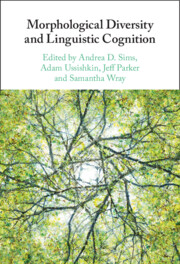Book contents
- Morphological Diversity and Linguistic Cognition
- Morphological Diversity and Linguistic Cognition
- Copyright page
- Contents
- Figures
- Tables
- Contributors
- Preface
- Abbreviations
- 1 At the Intersection of Cognitive Processes and Linguistic Diversity
- Part I In What Ways Is Language Processing Tuned to the Morphological Structure of a Language?
- Part II What Role Does Cue Informativity Play in Learning and How the Lexicon Evolves Over Time?
- Part III How Do System-Level Principles of Morphological Organization Emerge?
- 8 Morphology Gets More and More Complex, Unless It Doesn’t
- 9 Network Structure and Inflection Class Predictability: Modeling the Emergence of Marginal Detraction
- 10 Rule Combination, Potentiation, Affix Telescoping
- References
- Language Index
- General Index
8 - Morphology Gets More and More Complex, Unless It Doesn’t
from Part III - How Do System-Level Principles of Morphological Organization Emerge?
Published online by Cambridge University Press: 19 May 2022
- Morphological Diversity and Linguistic Cognition
- Morphological Diversity and Linguistic Cognition
- Copyright page
- Contents
- Figures
- Tables
- Contributors
- Preface
- Abbreviations
- 1 At the Intersection of Cognitive Processes and Linguistic Diversity
- Part I In What Ways Is Language Processing Tuned to the Morphological Structure of a Language?
- Part II What Role Does Cue Informativity Play in Learning and How the Lexicon Evolves Over Time?
- Part III How Do System-Level Principles of Morphological Organization Emerge?
- 8 Morphology Gets More and More Complex, Unless It Doesn’t
- 9 Network Structure and Inflection Class Predictability: Modeling the Emergence of Marginal Detraction
- 10 Rule Combination, Potentiation, Affix Telescoping
- References
- Language Index
- General Index
Summary
The past few years have led to the widespread recognition that morphology is an independent domain of language functioning in dynamic interdependence with more familiar domains such as phonology and syntax. This has permitted nuanced research into the organization of morphological systems as well as the development of hypotheses concerning factors responsible for such organization. In this chapter we compare two classes of hypotheses — adaptive explanations and neutral ones — for attested differences in morphological complexity claimed to correspond with sociocultural and demographic factors. While both examine language change as a (cultural) evolutionary process, we argue that much recent work on adaptive hypotheses for morphological complexity has been uncritically adaptationist, neglecting key results and lessons from population genetics about how to study evolutionary systems. Finally, we argue that neutral explanations are presently more likely explanations for the apparent association of morphological complexity and smaller, historically more isolated populations and should a priori be preferred over adaptive explanations unless and until a high evidential burden has been met.
Keywords
- Type
- Chapter
- Information
- Morphological Diversity and Linguistic Cognition , pp. 209 - 246Publisher: Cambridge University PressPrint publication year: 2022



